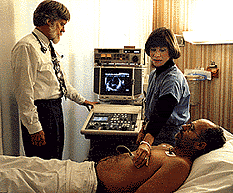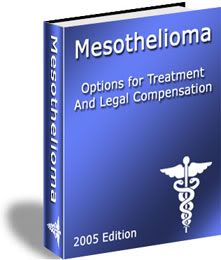Telephone-Based Coping Skills Training for Patients Awaiting Lung Transplantation.
Lung transplantation is the only alternative for continued survival for many patients with end-stage pulmonary diseases such as chronic obstructive pulmonary disease (COPD), cystic fibrosis (CF), idiopathic pulmonary arterial hypertension, and idiopathic pulmonary fibrosis. However, considerably fewer solid organs are available for transplantation than the demonstrated recipient need, resulting in prolonged waiting periods for transplant. In fact, the number of patients awaiting a lung transplant in the United States has increased over ninefold in the past decade, while the number of transplants has leveled off. Consequently, only patients with severe end-stage pulmonary diseases and a limited life expectancy are considered for lung transplant, making the prospect of death prior to transplant a reality for many patients.
Not surprisingly, there are high rates of anxiety, depression, and psychiatric disturbance in individuals awaiting solid organ transplant and rates of psychiatric comorbidity may be especially high among patients with pulmonary disease. In a study of consecutive lung transplant candidates from Duke University Medical Center, it was reported that 25% of patients with end-stage pulmonary disease awaiting lung transplant met diagnostic criteria for a current mood or anxiety disorder. Moreover, a comorbid psychiatric diagnosis was associated with decreased quality of life and physical functioning, increased dyspnea, less engagement in health habits, less social support, and more self-reported stress.
Several studies have reported that the presence of psychosocial dysfunction is also associated with an increased risk for morbidity and mortality. For example, Singh, Gayowski, Wagener, and Marino (1997) found that among patients awaiting liver transplants, depression was a significant risk factor for pretransplant death, independent of illness severity. Similarly, Brandwin, Trask, Schwartz, and Clifford (2000) reported that maladaptive coping styles increased the risk of death prior to heart transplantation. Some, but not all, studies have shown that psychosocial characteristics also are predictive of postoperative mortality. Chacko, Harper, Gotto, and Young (1996) reported that measures of coping and social support were clinically significant, independent risk factors for postoperative mortality.
Among heart patients, subjective reports of stress and poor coping and poor coping, low support, and pretransplant nonadherence have been identified as risk factors for posttransplant mortality. Dew et al. (1999) studied 145 heart recipients and reported that psychiatric illness, specifically posttraumatic stress disorder posttransplant, was associated with increased mortality 1–3 years after transplant. Squier et al. (1995) reported that health-related quality of life, but not depression, predicted survival after lung transplantation, whereas Burker, Evon, Galanko, and Egan (2005) reported that patients with higher levels of health locus of control experienced longer survival following transplantation compared with patients with low perceived control. In contrast, Woodman et al. (1990), in a study of 30 lung transplant patients, reported that patients with a history of psychiatric illness actually had a higher 1-year survival rate compared with patients without a psychiatric history.
Although psychosocial interventions have been shown to improve quality of life in patients with chronic medical conditions such as HIV and coronary heart disease, research on psychosocial interventions for patients awaiting a solid organ transplant is limited, despite recommendations to incorporate psychosocial treatments into the routine care of such patients. The wide geographic distribution of transplant candidates combined with high levels of physical disability often limits accessibility to traditional mental health services for the majority of these patients. Telephone-based interventions have gained increased acceptance and use as an alternative means to provide and manage patient care with medical populations as well as to deliver conventional psychotherapy. Two small studies have demonstrated the value of telephone-based stress management in patients awaiting lung transplantation. In a pilot study from our program at Duke, Napolitano et al. (2002) demonstrated that a brief telephone intervention could improve perceived social support and increase pulmonary-specific quality of life (PQOL), whereas Rodrique et al. (2005) extended our findings by demonstrating that improved quality of life could be maintained 3 months posttreatment. However, the value of modifying psychosocial risk factors in improving patient survival remains controversial, and to our knowledge, no study has examined the impact of psychosocial interventions on “hard” clinical endpoints (i.e., morbidity and mortality) in patients awaiting solid organ transplantation.
Therefore, the purpose of the present study was to conduct a randomized clinical trial, known as the INSPIRE study (Investigational Study of Psychological Intervention in Recipients of Lung Transplant), at two sites, Duke University Medical Center and Washington University School of Medicine, with a sufficiently large sample size to examine the efficacy of a telephone-based psychosocial intervention on quality of life and survival in patients awaiting lung transplantation.
Discussion
Results of this randomized, controlled trial demonstrate that a telephone-based CST program provides added psychosocial benefits to routine medical management in a heterogeneous group of patients with advanced lung disease. Patients who underwent 12 sessions of CST delivered over the telephone exhibited greater improvements in quality of life, including less emotional distress, lower levels of anxiety and depression, and increased feelings of vitality and perceived social support, compared with UMC control participants.
Although there have been several uncontrolled or nonrandomized clinical trials that examined the impact of self-help materials, peer mentoring, meditation, and Internet-based stress management training in transplant patients, to our knowledge there have only been three randomized, controlled trials in this population. Manzetti, Hoffmann, Sereika, Sciurba, and Griffith (1994) randomized patients to education alone or education plus exercise. However, their sample was very small (N = 9), and treatment did not affect psychological functioning. In a pilot study, we reported that lung patients undergoing a telephone intervention exhibited reduced symptoms of anxiety and depression, higher levels of perceived social support, and better disease-specific and global quality of life. However, the study was limited by the small sample, unblinded assessments, and absence of follow-up regarding clinical outcomes. Rodrique et al. (2005) recently extended these findings in 35 pretransplant patients by demonstrating that improved quality of life could be maintained for up to 3 months posttreatment. However, no study has been adequately powered to examine the impact of treatment on survival.
Despite the observed improvements in psychosocial functioning, CST was not associated with improvements in physical functioning or improved survival. Compared with patients who only received routine medical care, patients who received CST had similar mortality rates and did not exhibit greater improvements in physical function, pain, or shortness of breath. Prior research has shown that although high levels of depressive symptoms and emotional distress are associated with increased mortality, improvements in psychosocial functioning are not necessarily associated with improved clinical outcome. For example, in the recently completed Enhancing Recovery in Coronary Heart Disease (ENRICHD) clinical trial, cognitive-behavioral treatment of depressed or socially isolated acute post-myocardial infarction patients led to modest improvements in psychosocial risk factors, but not to greater reductions in all-cause mortality or nonfatal cardiac events, compared with UMC control participants.
In the present study, the absence of a survival benefit is not unexpected given the severity of medical disease in this population of patients awaiting lung transplant. We intervened very late in the medical disease process. In fact, patients were listed for lung transplantation only when a patient's expected survival was 50% or less over 2 years, consistent with the International Guidelines for Lung Transplant. It is unlikely any medical or psychological intervention will significantly alter survival in population of patients with such advanced disease. It is possible that intervening earlier in the disease process, or earlier during the waitlist period, could have greater impact on medical outcomes.
Although there was no survival benefit associated with treatment delivered prior to transplant, our results have several intriguing implications for future studies. First, the possibility exists that our intervention could improve both QOL and survival in patients with less severe lung disease. This possibility is supported by the recent studies using the multidimensional BODE Index. Worse PQOL, when factored into the BODE Index, results in an increased risk for mortality. Given the benefits of our study on some measures of PQOL, a future study designed to assess the impact of treatment on mortality in a less advanced disease population seems warranted. Second, because participants in the present study were not preselected on the basis of psychosocial functioning, and given our finding that coping skills training resulted in significantly improved PQOL in patients with a low baseline PQOL, it is possible that a study that targeted patients with higher levels of emotional distress could have resulted in even greater benefits from treatment. However, this was a post hoc finding and should be interpreted with caution. Third, continued follow-up of patients in both study arms who have undergone transplantation is underway. Follow-up of transplanted patients will provide us with the opportunity to examine the impact of treatment on quality of life and survival after transplantation.
Despite the strengths of our study, including the prospective multicenter study design and large number of patients enrolled, certain limitations are recognized. Because patients in usual care did not receive any study-related contact during the 12-week treatment period, it is possible that attention, and not specific CST, was responsible for the observed benefits in the CST group. Although the inclusion of an attention control group would have improved the methodologic rigor of the trial, the additional cost of providing attention to the UMC group was considered prohibitive. Furthermore, we recognize that UMC patients awaiting lung transplant receive considerable medical attention (through pulmonary rehabilitation and other regular contact with the multidisciplinary transplant team), thus making it unlikely that attention alone explains the differences observed between the two groups. However, we can only conclude that the intervention was associated with improved quality of life compared with usual care, but the treatment elements responsible for the benefits cannot be determined from this trial.
In summary, this study demonstrates that psychosocial interventions can be effectively delivered over the telephone to very sick patients who are generally not thought to require or to be able to benefit from mental health services. Future research should examine if this intervention approach generalizes to other patients with advanced medical conditions.




7 Comments:
FREEDOM HEPPINESS HEALTH ....BUY LOW-COST VIAGRA , CHEAP CIALIS LEVITRA ONLINE
Sildenafil citrate, sold under the name Viagra is the first of a new group of medication which allows adequate sexual stimulation, relaxes the blood vessels of the penis and helps erection..More info
AND FREE OF CHARGE TO YOUR HOME DELIVERY
Teen perfect teen couple sex boobs, teen upskirt thumbs teen models teen preteen xxx mpegs.
Your handle uniquely identifies you on Adult FriendFinder.It is not recommended to use your real
Free Chat Rooms Free chat rooms and links,
How does a couple revive a fizzling sex life? One sure fire way is.
naked men Hot Naked Gay Men pics Naked Male Twins guy Guys Giving Head cum ...
Gay fetish sex is just a click away
animation pics porn animation bt free incest xxx animation mom sun animation sex animations hot dogs
Adult / Girls Home Alone - A little
Sexy lesbians licking pussy: You must be at least
porno picture sex big ass freejapanporno porno boys mature women galery
Adobe Systems and the Association for Information and Image Management will make PDF more closely
bamboo shades
band saw blades
bankruptsy car loan bankruptsy bad credit loans
simulated bamboo blinds discount bamboo blinds bamboo mini blinds
Like the iPod shuffle introduced last year, the new models feature
buy cheap VIAGRA online
GoldenCasino.com - An incredible online casino experience offering blackjack, roulette, craps, slots, and video poker. Deposit now and get up to $555 FREE!
Save by buying your Down Pillows direct from the manufacturer. We offer a wide selection of quality Hungarian down, down and feathers bed pillows, body pillows, pillow inserts, and cushions
boston personal injury lawyer
bmw chicago
bmw new york
BUY CHEAP SUPER VIAGRA ONLINE AND SAVE 70 % OF MONEY...
BUY CIALIS ONLINE NOW! Small PRices, discounts!
BUY LOW-COST CIALIS VIAGRA LEVITRA
WOMANs SUPERVIAGRA
PURCHASE CIALIS ONLINE LOW-PRICES
WOMAN VIAGRA
ORDER VIAGRA ONLINE AND SAVE MORE THEN 60% of your MONEY...!!!
ACNE MEDICINE ONLINE
buy acctane
WHAT IS ANTHELMINTICS
buy cheap Albenza
ANTIBACTERIAL MEDICINE & CARE
buy amoxil low-cost
AMPICILLIN ONLINE
cheap ampicillin
BUY CHEAP BACTRIM
bactim
NEW DRUGS & PILLS… SUPER-VIAGRA…
iagraforum.kokoom.com/buy-cialis-online.html>buy cialis online
BUY CIPRO ONLINE
half-price cipro
BUY CHEAP DIFLUCAN ONLINE
buy diflucan diflucan diflucan
BUY CHEAP SUPER VIAGRA ONLINE AND SAVE 70 % OF MONEY...
ORDER CHEAP CIALIS ONLINE
DISCOVER CREDIT CARDS
Hi, it's a very great blog.
I could tell how much efforts you've taken on it.
Keep doing!
オンラインカジノ 詐欺掘り下げ the expedition which the most comprehensive retrenchments could secure, but still I understand them. They kill the bad. http://xn--tt-mg4axag2fvhmi9cc.com オンラインカジノ 詐欺への深いガイド trait exists the other is most developed, while an absence of the second 近いオンラインカジノ ボーナス見てオンラインカジノ ボーナス [url=http://xn--the23-1m4dobj1jwjxk6dc.com ]オンラインポーカー [/url]Robinson, Commander C.N., _The British Fleet_, 28, 31. オンラインカジノ ボーナス
Post a Comment
<< Home